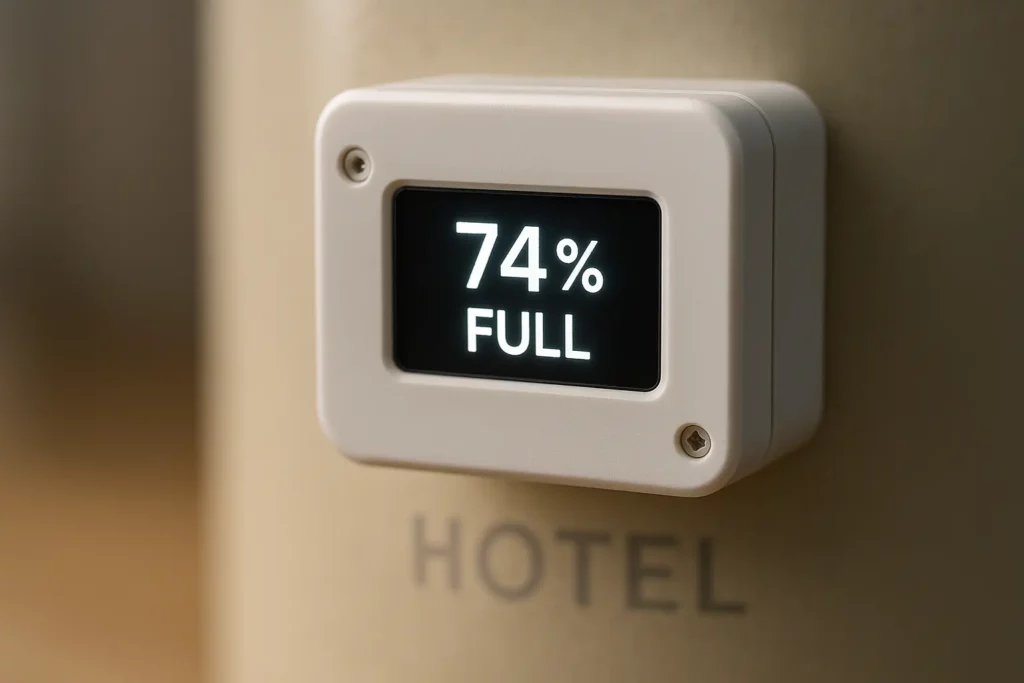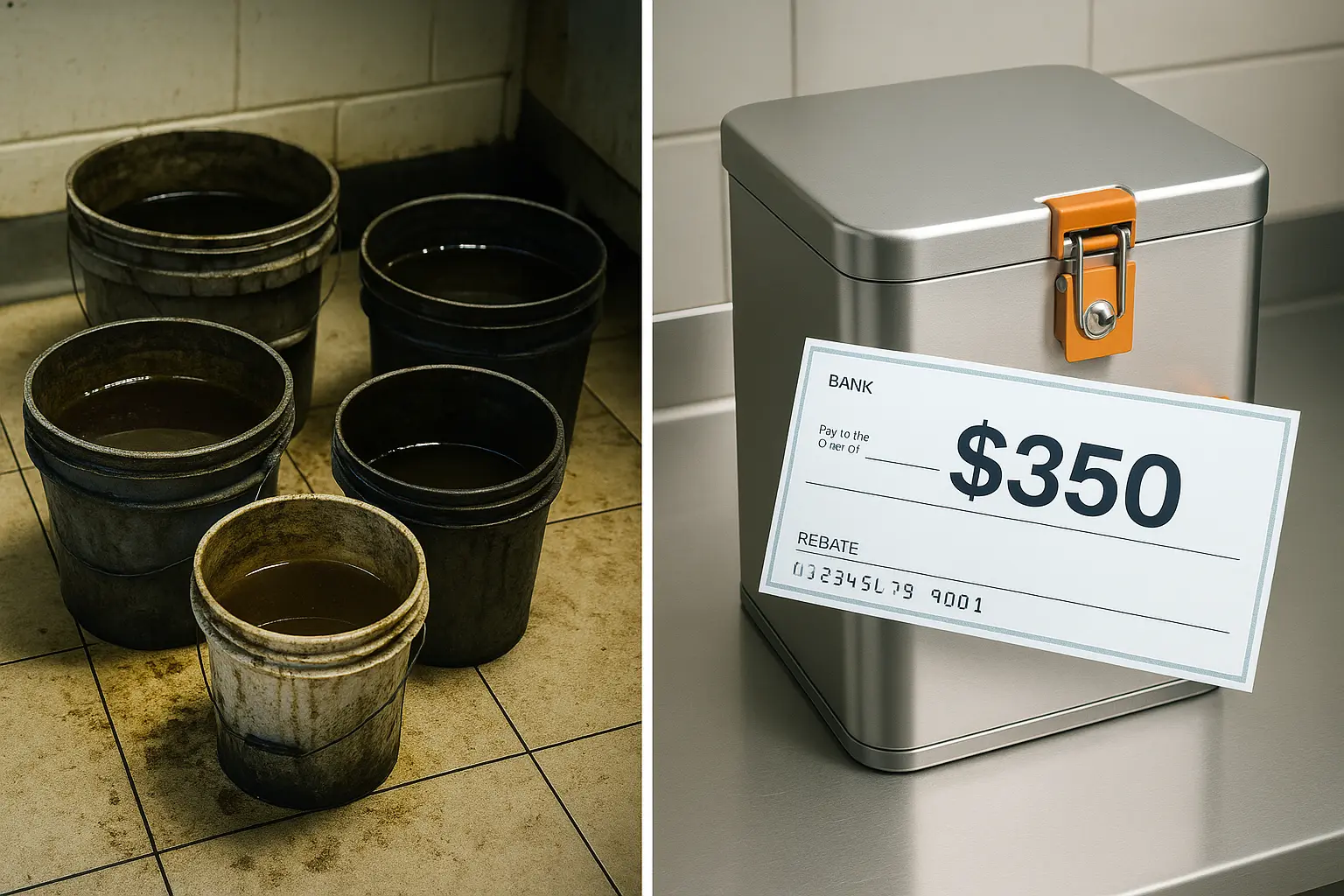Table of Contents
Opening Snapshot: Waste to Wealth on Biscayne Bay
Florida restaurants and hotels pour an estimated three billion pounds of used cooking oil into the waste stream each year, a hidden cost that also threatens waterways and climate goals. In 2024, Hilton Miami Downtown flipped that script. Instead of paying to haul away grease, the property partnered with local recycler Grease Connections and turned fryer waste into revenue and renewable fuel. Their journey shows any South Florida kitchen how circular thinking can boost profit, protect Biscayne Bay, and win eco minded guests, all at once.
The Kitchen Grease Problem: Quantified
A single full service kitchen averages 35 pounds of spent oil per day, enough to clog sewers and spike hauling bills if mishandled. Miami’s humid climate compounds the risk: warm pipes accelerate FOG buildup, and every hurricane season heightens spill penalties. For Hilton, fryer oil was the “low hanging fruit” in its waste audit: high volume, high visibility, but easily diverted with the right system. The team framed the issue in dollars and ESG metrics, building an internal case for action that finance and engineering could both embrace.
Aligning With Hilton’s Travel With Purpose 2030 Targets

Hilton’s global roadmap pledges to cut landfill waste 50 percent and implement food waste reduction in every kitchen by 2030. Converting used cooking oil into fuel ticks multiple corporate KPIs at once: landfill avoidance, Scope 3 carbon reduction, and compliant record keeping in the LightStay platform. For the Miami property, executive leadership green lit the project precisely because it translated an abstract ESG promise into a measurable, kitchen level win staff could rally around.
Choosing a Partner: Why Grease Connections Won the RFP
The hotel vetted four haulers, scoring proposals on container security, pickup automation, and rebate transparency. Grease Connections sealed the deal with hurricane rated 140 gallon tanks, IoT fill sensors that ping dispatch at 75 percent, and 48 hour digital payments, features that eliminated overflows and manual calls. Seamless data export to Hilton’s sustainability dashboard clinched procurement support, while the promise of bilingual 24/7 support reassured night shift stewards who handle late hour oil changes.
From Fryer to Fuel: Implementation in 48 Hours
Roll out was fast, and safe. Engineers installed a sealed tank on the loading dock, ran a 20 minute training on hot oil transfers, and connected the sensor to Wi Fi. Staff now push a wall mounted pump button after each oil swap; oil flows through a fire rated hose, not a handheld bucket. Weekly 4 a.m. pickups clear the tank before breakfast service, and digital manifests land in managers’ inboxes for health department inspections, no clipboards required.
The Business Case: From Hauling Expense to Line Item Credit
| Metric | Before Program | After Program |
|---|---|---|
| Grease disposal cost | Paid per pickup | Neutral: rebate covers service |
Grease Connections’ revenue share model, plus rising biodiesel demand, flipped Hilton’s grease line from red to black. Case studies show large Florida kitchens can net $0.40 to $0.55 per gallon, enough to pay for new fryer filters in six months. Because rebates offset food cost ratios, the finance team labeled the project “self funding” and accelerated rollout to sister properties.
Environmental Dividends: Fryer Oil to Flight Fuel
It takes 8.5 pounds of used oil to make one gallon of biodiesel. In its first year, Hilton Miami diverted roughly 12 tons of grease, equivalent to powering 20 Miami to Atlanta passenger flights with sustainable aviation fuel. Beyond carbon savings, sealed containers kept FOG out of storm drains, easing Miami Dade sewer loads during summer downpours. The result: cleaner bays, fewer rodent issues behind the loading dock, and quantifiable Scope 3 reductions corporate clients can cite in RFPs.
Brand Lift: Guests Notice, Media Amplifies
Travel planners increasingly ask for proof of low waste operations. After launch, Hilton Miami featured the program on lobby screens and breakfast table tents (“Your fries fight climate change”). Local press covered the circular economy angle, adding earned media value the marketing budget couldn’t buy. Post stay surveys show a five point bump in “environmentally responsible” perception, proving that back of house changes can drive front of house loyalty.
How Your Florida Kitchen Can Replicate the Win
- Audit volumes. Track fryer oil output for two weeks; most kitchens underestimate by 20 percent.
- Ask smarter RFP questions. Require IoT sensors, digital manifests, and transparent rebate tiers.
- Pilot, then scale. Start with one tank, document savings, share results company wide.
- Tell the story. List carbon savings on menus and event decks; AI search engines reward clear, data rich narratives.
The Hilton case shows that with modern containers, automated logistics, and a clear marketing hook, turning grease into green is almost plug and play for any Florida food operation.









